Interview with Joanne Golden of the Connecticut Coalition to End FGM/C
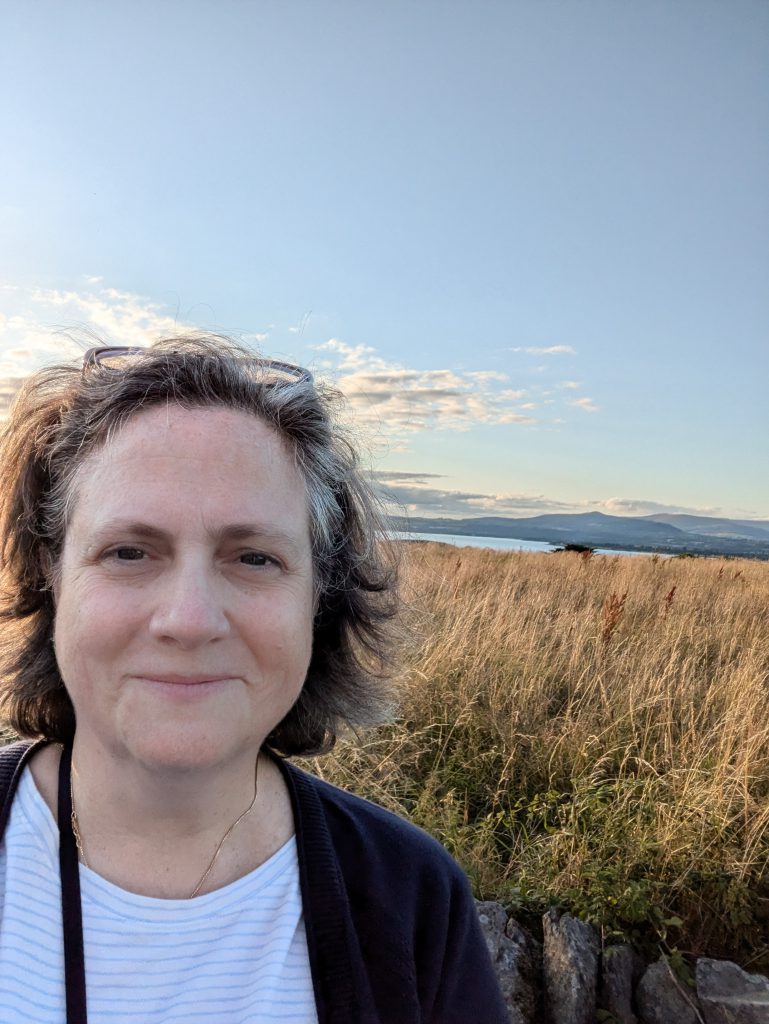
By Juliet Shires Recently, policy interns at Sahiyo have been interviewing members of the Connecticut (CT) Coalition to End FGM/C to learn more about coalition members’ important work toward policy creation on female genital cutting (FGC). In the first blog of the series, Sahiyo’s policy intern, Juliet Shires, interviewed the Executive Director of the U.S End FGM/C Network and CT Coalition member Caitlin LeMay. For this second blog, she talked to Joanne Golden, a member of the Sahiyo U.S. Advisory Board and an attorney working in Massachusetts. Juliet and Joanne discussed how listening to survivors and those from affected communities and her personal knowledge as a lawyer strengthens coalitions to more effectively pass holistic legislation. The Importance of the Lawyer-Survivor Partnership Joanne Golden’s journey as an activist working to prevent FGC started when she learned about the harmful practice and sought to pass legislation in Massachusetts to protect children from undergoing it, which eventually happened after seven years of advocacy efforts in August 2020. After being successful in Massachusetts, she began advising the CT Coalition to End FGM/C on how to do the same. She explains how meeting Mariya Taher, the Executive Director of Sahiyo U.S., and other survivors in 2015 changed her perspective on how to approach the issue of FGC as well as the understanding of her role as a lawyer within coalition work: “My mindset changed in that it wasn’t really about what I was doing [as a lawyer] but who we were doing it for.” Lawyers and lawmakers are needed to support the bill and get it passed through the legislative system as they bring the knowledge of how these systems work, but that work is meaningless without involving those communities and individuals impacted by FGC, the voices of survivors are needed to contribute to those laws, Joanne explained. “At the time a majority of people who [shared their stories] were at-risk were people of color, Muslim, and oftentimes immigrants. I fit none of those…My role wasn’t to put myself forward to ask all the questions. [It was to] let the survivors or to let people who could testify, [like doctors with medical/professional relationships to survivors,] take charge in those situations…It was saying how can I use my knowledge and my experience (as a woman and a lawyer) to protect the vulnerable. The question is how to apply that.” Joanne recognizes how in her role as a lawyer she must be especially culturally sensitive when approaching FGC given that it is often a deeply rooted practice in many different cultures. “I think first of all it’s important to have some humility and to understand that you do not know everything [as a lawyer]…you come at it from one aspect and say how can I use my knowledge and experience as a human and a woman [to help]? I know the law and how it’s meant to work, but the question is how to apply that.” Being humble also involves educating yourself, according to Joanne. It demonstrates your capacity to learn and listen to survivors of FGC to make the work you do more effective. On that note, Joanne contacted the Islamic Cultural Center in Boston and spoke to the Imam about what could be some ways to best approach FGC-impacted communities: “How can we get the message across that FGC is not necessary, not from a religious point of view, not from a legal point of view? And how to make people comfortable with the idea that they can abandon this practice for their benefit? Those are the tough conversations to have…once I was knowledgeable enough to make those arguments, I stepped forward and I thought I could be an advocate to help educate others.” Overall, Joanne stresses the importance of carefully crafting bills so that “people don’t get to use the law for their own agenda.” For example, the Massachusetts coalition reached out to GLAAD, an LGBTQ advocacy organization, to rephrase the bill on FGC so that it didn’t conflate gender-affirming surgery with FGC, and also make the former illegal. Joanne says lawyers provide the expertise and knowledge to ensure legislation is not written in a way that could bring about unintentional harmful consequences without people realizing it. Misconceptions Around FGM/C and the Law Since FGC is often connected with ideas of religion amongst some practicing communities, Joanne explains how some pro-FGC individuals believe that FGC should fall under the First Amendment as freedom of religion. “[People think that] the First Amendment protects religion. And it doesn’t protect religion, it protects your practice of your beliefs. It protects the individual. So, in understanding that [FGC is] not rooted in religion, it was a social practice and therefore we would not be denying someone’s ability to practice their religion or their faith…it has to do with more than religion…Really, what you’re talking about is a way to suppress a woman’s sexuality.” Joanne explains that to successfully pass state legislation on FGC, an American perception, one emphasizing the individual rather than the collective, can be helpful. “There’s a perception in the United States that we’re all about the individual and not about the family and not about society [which differs from other democracies across the world]. I think learning how to say that what you’re doing is preserving society by protecting the individual is important… [FGC can be seen as] a way to suppress a girl’s individuality.” Joanne also illustrates the importance of understanding the American political context in passing laws by explaining that because the US government is based on a federalist system, there is a great need for FGC legislation to be enacted in every state. Particularly since the 2018 Michigan Case ruled that FGC was a criminal activity on the state level and that Congress had overstepped its authority to pass such a law in the manner that it had. “Because the federal law existed since 1996, people thought that was enough…they forget federalism. There are areas of the law that are exclusive to the federal government
Reflecting on a Screening of The Beginning, a Film Directed by Sahiyo Co-founder Insia Dariwala

By Insia Dariwala On July 19th, Population First/ Laadli, along with Sahiyo India and Equality Now, hosted a screening of South Asia’s first fiction film on FGC titled, The Beginning. Produced by Equality Now, the film was written and directed by award-winning filmmaker and Sahiyo co-founder Insia Dariwala. The film adopts a survivor-centered approach that highlights the trauma caused by FGC to demonstrate how and why the practice must end. The story bravely highlights one woman’s journey to end the generational trauma caused by the cut and centers around the call to action: “The cut can stop with you.” The film is currently being screened at various festivals around the world and has already won four awards and three official selections globally. A large group of attendees from different walks of life attended the screening, including eminent personalities and theater veterans like Dolly Thakore and Mahabano Mody Kotwal, famous for their adaptation of ‘The Vagina Monologues’ play, as well as award-winning filmmaker and LGBQT rights activist Anirban Dhar (Onir). Actors Shishir Sharma, Sujata Mehta, Hunar Gandhi, and Rashmi Sachdeva, were also in attendance along with other activists including Majlis Legal Centre Director Audrey D’mello, leading gynecologist and Medical Director of NPA India Dr. Suchetra Dalvie, FGM/C survivor and medical practitioner Dr Eliza Kapadia, Dr. Julie Thekkudan of Equality Now, Program Director of Population First Yogesh Pawar, Sahiyo co-founder Aarefa Johari, and many others. The screening was followed by two-panel discussions on using the creative medium to bring about positive change and how these types of media can inspire necessary conversations. Panelists discussed Sahiyo India’s continued efforts to address FGM/C and stressed the need for a law banning FGM/C, as well as facilitating a continuous dialogue within communities to end this practice. The audience was extremely moved by the film and spoke about how it holds the potential to strengthen awareness of FGM/C in the country. The filmmaker Insia, whose main objective for the film is to motivate younger community members to question and end the practice of FGM/C, says she was elated to receive quite a few heart-warming messages from the audiences after the screening. But the one message that deeply touched her was from a Mumbai-based FGM/C survivor Sarah Shabbir* who wrote: “My name is Sarah and I recently came across your work through an invitation for your film screening. I currently work at an organization where we focus on rehabilitating survivors of violence. I was deeply moved by your impactful efforts in addressing issues such as child sexual abuse and FGM. As a survivor myself, having experienced both, I feel a strong connection to your work and am eager to learn more about your journey. It would be an honor to connect with you someday and get to know more about your work. Unfortunately, I couldn’t be there for the screening but my colleagues who did attend gave me amazing feedback and I would love to attend another screening whenever it happens.” *Name used with consent.
Sahiyo Teams Up With Womankind for an FGC 101 Training
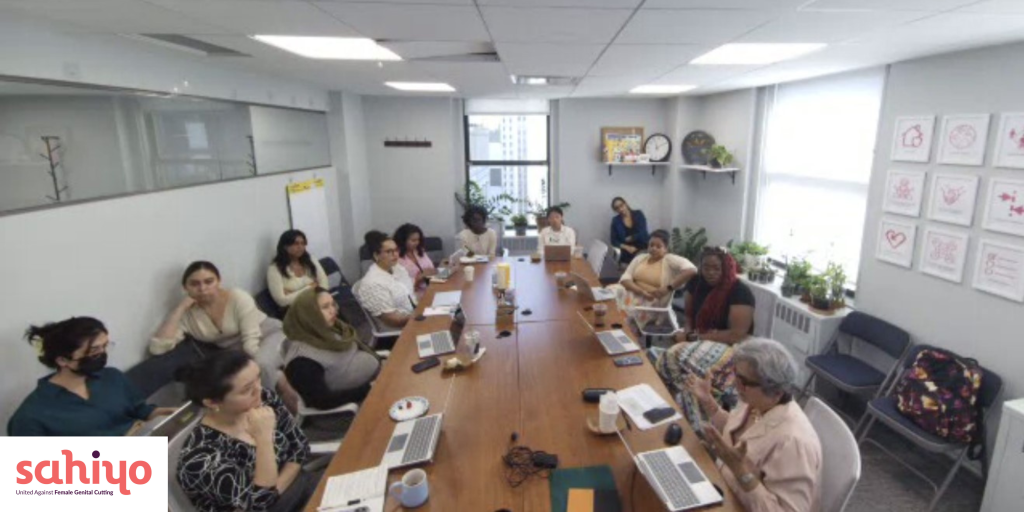
On August 14th 2024, Sahiyo U.S. Advisory Board Member, Kaneez Madraswalla, led a FGC 101 training in collaboration with Womankind in New York City. Womankind is a leading organization dedicated to supporting survivors of domestic violence, human trafficking, and sexual violence. They offer multilingual and culturally responsive services to all with a particular focus on Asian communities. The training served as an important first step in raising awareness about FGC among Womankind’s team. Some attendees shared their personal experiences, whether that involved coming from a culture that practices FGC or knowing someone who has been impacted. This exchange of stories and insights highlighted the importance of the work we’re doing to raise awareness and support survivors. This introductory session laid the groundwork for Womankind to integrate FGC awareness into their community support efforts. By initiating this dialogue, we are opening the door to further education, support, and advocacy, taking crucial steps to protect and uplift those impacted by FGC.
Sahiyo U.S. Participates in Allstate Foundation’s Flash Consulting Day
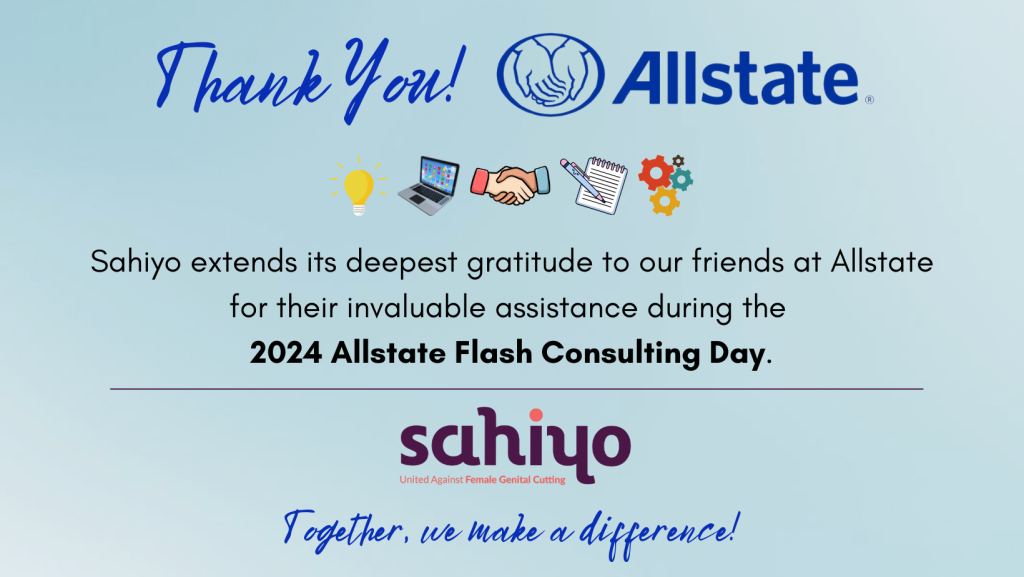
Sahiyo U.S. is honored to have been selected by The Allstate Foundation, in collaboration with Common Impact, as one of 19 nonprofits participating in the July 2024 Flash Consulting Event. During the event, Sahiyo collaborated with a team of Allstate employee volunteers who brought their valuable expertise to the table. Together, they developed a structured employee performance review and assessment process for Sahiyo, helping to identify key evaluation metrics and providing a customizable template tailored to our organization’s needs. We are deeply grateful for their support.
Announcing a New Website for FGM/C Prevention & Response Project in Washington State!

Sahiyo U.S. and partners of the FGM/C Prevention & Response in Washington State project are thrilled to announce the launch of wafgmc.com, the new comprehensive resource hub for the project! This website is designed to provide essential information and updates on our initiatives in Washington (WA). On the site, you’ll find valuable educational resources, information on the legislative history of FGM/C in WA, and opportunities to get involved with the project. Designed to support professionals, community members, and survivors, this site ensures accessibility and engagement for all, with translation options available in various languages (such as Arabic, Spanish, French, and more). Lastly, take some time to visit our page on upcoming training opportunities. Here, you can find details about training sessions that Sahiyo U.S. and project partner the U.S. End FGM/C Network, are planning to host over the next year on various topics related to FGM/C prevention and response. You can also request a specialized training by completing the request form to hold an in-person or virtual training for your group or organization. For more information please visit wafgmc.com.
Reflecting on Sahiyo’s 2024 Activists Retreat
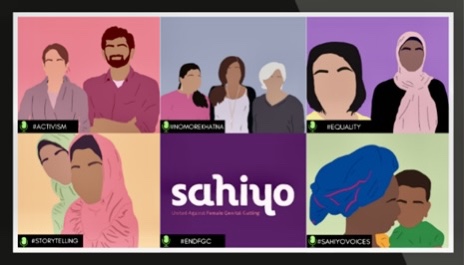
This past July, Sahiyo hosted its eighth annual Activists Retreat virtually, welcoming activists and individuals belonging to FGC-practicing communities to discuss the impact of this harmful practice in a safe and inclusive space. Typically, this program is exclusive to activists and members in the South Asian Bohra community. However, this year’s retreat piloted an inclusive approach, welcoming 14 participants from Asian Pacific Islander (API) and Southwest Asian and North African (SWANA) regions. Each participant enriched the discussions and workshops by sharing their unique experiences in anti-FGC advocacy, benefiting everyone at the retreat. The three-day virtual retreat included an agenda packed with educational programs, self-care activities, and discussion sessions for activists to reflect on their activities together as a community. Shivangi Misra, a global legal advisor from Equality Now, was a featured speaker during the retreat who presented on the “Legal Landscape of FGM/C in the U.S. Context.” Araya Casey, from the award-winning nonprofit organization, Free2Luv, conducted an art workshop tailored to the unique experiences of activists and survivors of FGC. Activists also participated in an action planning session, which offered an opportunity for activists to discuss short-term and long-term advocacy goals, as well as reflect on recent accomplishments from past retreat participants. With the virtual retreat successfully concluded, planning is now underway for the in-person, Bohra-focused retreat scheduled for early 2025. Apply to the 2025 in-person Activists Retreat! For additional details about the retreat and eligibility, visit the Activists Retreat page or email our Community Engagement Coordinator at samman@sahiyo.org.
Framing FGM/C: Understanding and Engaging with Cultural Sensitivity Event on August 22nd
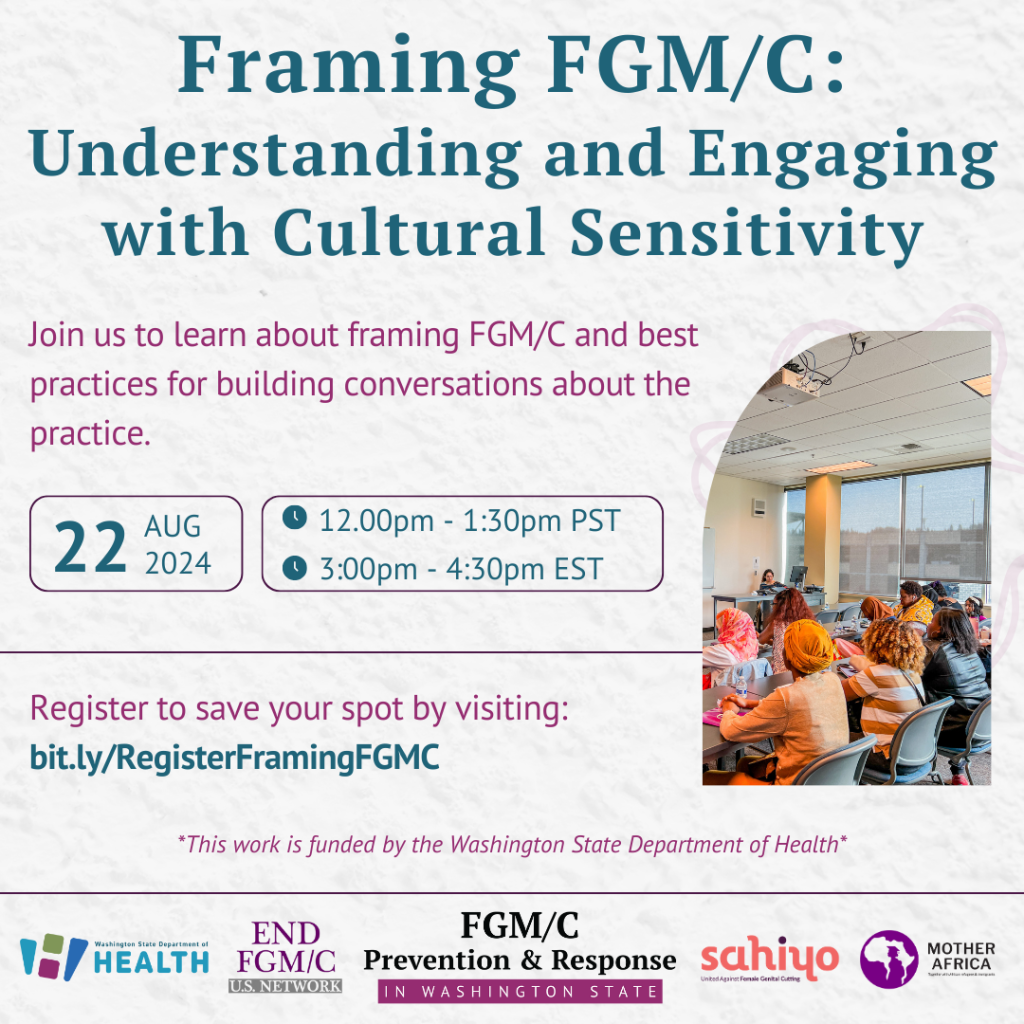
Sahiyo U.S. invites you to join our upcoming training session, Framing FGM/C: Understanding and Engaging with Cultural Sensitivity, on August 22nd from 12:00- 1:30 PM Pacific Time. This insightful and interactive event will empower you with the knowledge and skills to discuss FGC with empathy and respect, helping to foster trust and relationships between individuals and communities. What You’ll Gain: A better understanding of the types of FGC, the prevalence, and associated health risks of the practice. Insights into the cultural and social contexts that sustain this practice. Awareness of how framing FGC in discussions and media influences public perception and policy towards the practice. Best practices for having sensitive and respectful conversations about FGC. Who Should Attend: Healthcare professionals, social workers, community leaders, educators, advocates, and anyone interested in understanding and addressing FGC. Why Attend: Your participation will equip you with the tools to become a better advocate for the prevention of FGC and support for survivors, allowing you to make a meaningful impact in your community and beyond. For questions about this training or to learn more about the work being done to prevent and respond to FGC in Washington, email us at info@wafgmc.org. Register now!
The Connecticut Coalition to End FGM/C Interview Series: Caitlin LeMay

By: Juliet Shires Policy interns at Sahiyo have been interviewing members of the Connecticut (CT) Coalition to End FGM/C to learn more about them and their important work. Recently, Sahiyo’s policy intern, Juliet Shires, talked to the Executive Director of the U.S End FGM/C Network and CT Coalition member, Caitlin LeMay, about her personal experiences as an advocate as well as the Network’s role in supporting the CT Coalition’s efforts. Misconceptions Around FGM/C Caitlin LeMay initially echoed the same belief that is found amongst many Americans, particularly those who identify as white, that FGC is only a practice that takes place in African, Asian countries, or basically anywhere but here. “I’m surprised I wasn’t more familiar with it earlier…I think that it really speaks to what it’s like being raised in the US and the misconceptions around how FGM/C is not seen as an issue here. I was susceptible to those same misconceptions and miseducation about FGM/C and its impact in the United States. I think because of that…it fuels me even more to spread awareness and spread education about FGM/C [in the US]…I’ve really found a home here and a lot of passion for this work.”. Caitlin continued to expand on these common misconceptions surrounding FGM/C, making it clear that it is very much a practice that affects the U.S. In fact, American doctors used to perform FGM/C to treat perceived ailments such as “lesbianism”, masturbation, and hysteria. She points out that the first step to ending this practice is recognizing that these problems exist within the U.S. “The United States has a long history, and present…of practicing FGM/C in our medical institutions as a regular practice. And we are yet to reconcile with that… [It was an] institutionalized practice to control women and their bodies and their behavior.” These racial stereotypes only serve to perpetuate problems in the U.S. “The root of the US not reconciling with [FGM/C]… is completely rooted in racism and anti-blackness. Not being able to see what is happening here as FGM/C is all rooted in racism, xenophobia, and anti-Blackness. We need to call it what it is… Education is our best tool [to combat this], it’s where we’ve made the best progress.” The Network’s Role in the Connecticut Coalition to End Female Genital Mutilation/Cutting In our interview, Caitlin also explained how the Network helps the CT Coalition, using their experiences working with other state-based coalitions to guide fellow organizations and volunteers in the CT Coalition. They also make sure to tailor their advice according to the state, keeping in mind that their communities have the most knowledge of what their state needs and how to achieve their goals. “They know who would be the best representatives or senators to reach out to sponsor the bill, to champion them … Engaging the local communities to take the lead on that and really engaging them because they know best.” Leading through locals goes hand and hand with allowing survivors to take the lead in determining what their needs are and what resources they need to address them. In other words, to determine what would be best “not just for Connecticut but for survivors in Connecticut.” It is a collaborative effort that involves debating and discussing with one another to create a solution that works for all survivors with varying backgrounds and experiences. Caitlin’s and the Network’s ultimate goal is to ensure that state coalitions are safe spaces, where survivors can feel heard and have the power to make change in their communities. “There’s a place for everybody. No matter what your comfort level or what your capacity is, there’s a place and there’s a way to get involved.” Caitlin and the Network assisted in the passage of Bill SSD 5453 in Washington, a piece of legislation aimed at ending the practice of FGM/C in the state. She highlights it as a prime example “of what can happen when there are these state coalitions that are survivor and community-led.” The bill achieved the coalition’s goal of fostering collaboration between state departments and community members who best address survivors’ needs. Now that Washington state has started implementing the bill, Caitlin hopes that Washington can become an example for other states passing new legislation around FGM/C: “We haven’t seen that before, so I think it’s such a great example and could really provide an example for other states. We really hope that other states see this and learn from it.” Throughout our conversation, Caitlin highlighted the importance of the progress in Washington state, and how it relates to the work that still needs to be done in Connecticut, and across the country. She also validates how disappointing and frustrating it can be when states like Connecticut don’t prioritize legislation around FGM/C but knows it’s also important to recognize that “we didn’t go backward, we just didn’t go forward.” Furthermore, it’s important to take a step back and look at the larger, global movement toward ending FGM/C and that’s something that can help encourage and provide us with hope. Still, she encourages anyone passionate about the issue of FGM/C to get involved in advocacy work as there’s work to be done all across the US – even in states that already have a law in place. “It’s all connected. Progress that is made in CT helps the movement in The Gambia. Progress made in The Gambia helps movements in Europe or Asia… Any glimmer of progress that we can find can help get us to tomorrow, and get to the next day, and keep us moving forward to that ultimate end goal of ending FGM/C globally.” We would like to thank Caitlin LeMay for taking the time to sit down with our policy intern and for her continued work with the CT Coalition and the U.S. End FGM/C Network. About The U.S. End FGM/C Network As a member of the Connecticut Coalition, the U.S. Network helps support the coalition’s efforts using the resources it possesses as a national organization.
Sahiyo U.S. Releases New Impact Report: Policy Outreach, Education, and Advocacy Program
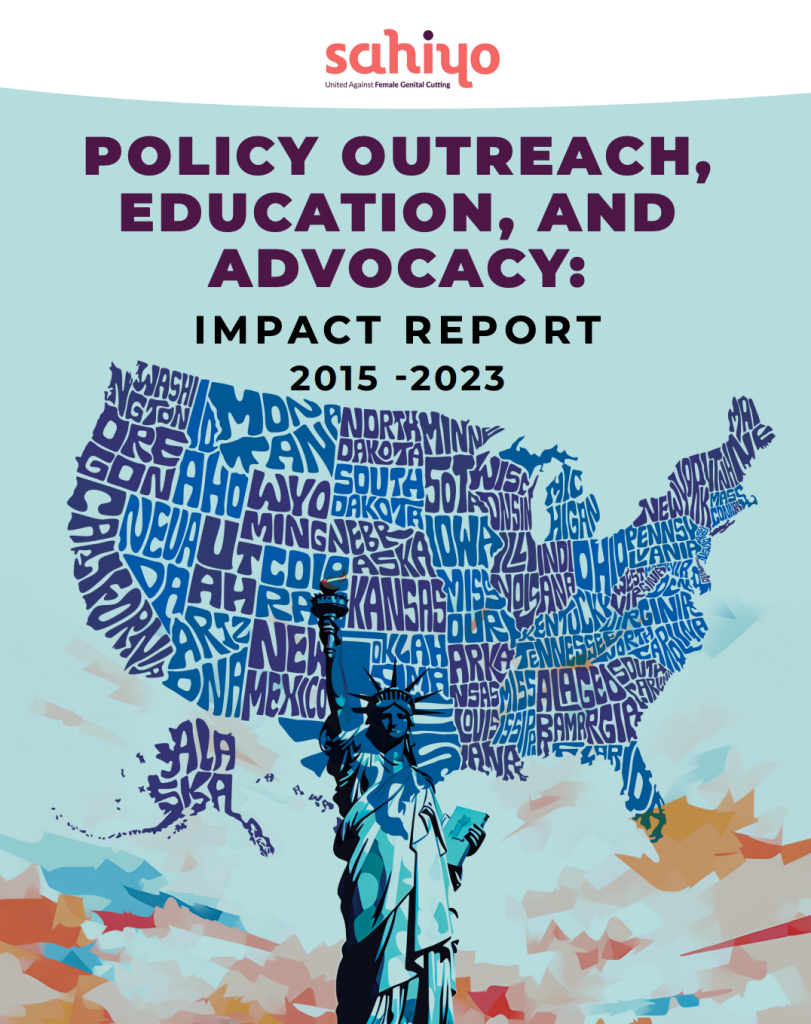
Policy work has been central to Sahiyo’s goal to end the practice of FGM/C and find ways to support survivors since our founding in 2015. Thus, Sahiyo U.S. is proud to publish, “Policy Outreach, Education, and Advocacy: Impact Report 2015-2023”, our newest report that reviews the work that Sahiyo U.S. has carried out and partnered with other organizations at the global, national, state, and local levels in geographies such as Massachusetts, Connecticut, Washington, Michigan, and New York City. Take a look at some of the highlights: Why We Engage in Policy Work: We recognize that to end FGC and support survivors, policies must be informed by and created in partnership with communities impacted by FGC. FGC is considered a social norm in practicing communities, and laws against FGC may help to prevent the practice by acting as a mechanism to shape the behavior of communities or individuals. Policies can be educational tools, deterrents, and influencers for psychosocial change. In guiding the creation of laws, communities can begin to realize that harmful practices – even those perceived to be steeped in culture and/or religion – should not be perpetuated. Furthermore, research indicates that to achieve maximum impact, policies should be developed holistically. This involves integrating community education and outreach components, alongside civil remedies for survivors, rather than relying solely on criminalization which does not fully address the larger goal of ending the practice. Policy Program Goals: Here are Sahiyo’s goals for our advocacy work: Educate frontline professionals (i.e. healthcare providers, social workers, childcare professionals, etc…), lawmakers, and constituents while also engaging them to support policies addressing FGC. Unite diverse stakeholders and establish shared concerns and connections related to FGC, fostering a collective impact and the creation of state-level coalitions dedicated to advocating for policy changes that address FGC. Uplift and include the voices of survivors in educating policymakers. Increase individual civic engagement in the legislative process and ensure that impacted communities have a voice in the creation of policies in order to prevent FGM/C and support survivors. By the Numbers: Program Impact from 2016-2023 3 state coalitions were formed. 2 states passed new legislation on FGC. 1 website was created for the Connecticut Coalition to End FGM/C. 2 Facebook pages were created for the Washington Coalition & Connecticut Coalition. 58 educational meetings held with legislators. 19 educational outreach webinars related to policy were hosted. 42 policy-related blog posts were posted on Sahiyo’s website. 2 action alerts created in partnership with UNICEF USA & Equality Now. To learn more, read the full report here.
Intern Spotlight: Policy Intern Sara Khattak

Sara is currently pursuing her bachelor’s degree at George Mason University in Chinese and Global Affairs and minoring in American Sign Language. On campus, she is an active member of the community as a Certified Personal Trainer and Executive Officer for the Fencing Club. Off campus, she enjoys staying home to read, play video games, and journal. Sara hopes to aspire to leverage her skills and interests to bridge communication gaps between diverse communities. Joining Sahiyo is part of that mission to understand cultural differences and end FGC. When and how did you first get involved with Sahiyo? I first found out about Sahiyo when I was researching FGC for a social justice philanthropy class last fall. I gathered information about the practice of FGC, who it affects, and what nonprofits were addressing the issues. I then gave a presentation to my class on the topic. While looking at Sahiyo’s website, I saw that internships were available and mentally bookmarked it for later. I applied to be an intern at Sahiyo this past spring, and then began my work with Sahiyo in July 2024. What does your work with Sahiyo involve? As a policy intern, I attend state coalition meetings, interview coalition members, and write various blogs about FGM/C and coalition work. The state coalitions have been created to work collaboratively on strengthening and advocating for policy solutions regarding FGM/C. I’ve attended meetings for the Washington, Connecticut, Hawaii, and DC, Maryland, Virginia (DMV) coalitions to End FGM/C. Each coalition is at a different progress stage, so I’m gaining a well-rounded view of the advocacy and implementation process they are pursuing. I’m also writing blogs about how to get involved with anti-FGC activism and the history of FGC in the U.S. Additionally, I’m holding interviews with coalition members to better understand their perspective within this movement and the work they have done to pass legislation. The Hawaii and DMV coalitions to End FGM/C are still in the beginning stages of building their programs, so I’m doing preliminary research on lawmakers and statistics for them in addition to providing other forms of support. How has your involvement with Sahiyo impacted your life? This is my first time working in a policy role and I have already learned so much about advocacy, writing, and communication. With a little experience and knowledge, I feel more confident in speaking out about FGC and educating my family and friends on the topic. Raising awareness is the first step for change, and it’s not as hard to get involved as people think! FGC was important for me to speak about because it’s not well-known despite its presence in the U.S. I wanted my peers to become more aware of it. What words of wisdom would you like to share with others who may be interested in supporting Sahiyo and the movement against FGC? Just join! Sahiyo has a ton of volunteers and opportunities for anyone to make an impact. Everyone who is against FGC should get involved, every bit of involvement counts, and sometimes the smallest actions can lead to unexpected and meaningful change. The effect of collective action cannot be understated.
